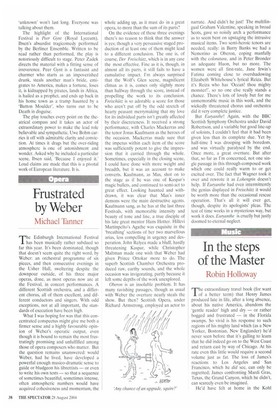Frustrated by Weber
Michael Tanner
The Edinburgh International Festival has been musically rather subdued so far this year. It's been dominated, though that doesn't seem quite the right word, by Weber: an orchestral programme of six pieces, and then consecutive evenings in the Usher Hall, sweltering despite the downpour outside, of his three major operas, done, as most operas now are at the Festival, in concert performances. A different Scottish orchestra, and a different chorus, all of them excellent, and different conductors and singers. With odd exceptions, not at all important, the standards of execution have been high.
What I was hoping for was that this concentrated conspectus might give me both a firmer sense and a highly favourable opinion of Weber's operatic output, even though it is bound to remain the most frustratingly promising and unfulfilled among those of opera composers who matter. But the question remains unanswered: would Weber, had he lived, have developed a powerful enough musico-clramatic sense to guide or bludgeon his librettists — or even to write his own texts — so that a sequence of sometimes beautiful, sometimes intense, often atmospheric numbers would have acquired cohesiveness and momentum, the whole adding up, as it must do in a great opera, to more than the sum of its parts?
On the evidence of these three evenings there's no reason to think that the answer is yes; though a very persuasive staged production of at least one of them might lead to a different conclusion. The one is, of course, Der Freischatz, which is in any case the most effective. Fine as it is, though, in almost all its parts, it still fails to have a cumulative impact. I'm always surprised that the Wolf s Glen scene, magnificent climax as it is, comes only slightly more than halfway through the score, instead of propelling the work to its conclusion. Freischatz is so adorable a score for those who aren't put off by the odd stretch of hearty peasant merrymaking that my love for its individual parts isn't greatly affected by their discreteness. It received a strong performance, with Charles Mackerras and the tenor Jonas Kaufmann as the heroes of the occasion. Mackerras made sure that the impetus within each item of the score was sufficiently potent to give the impression that it carried through the whole. Sometimes, especially in the closing scene, I could have done with more weight and breadth, but it was an account to make converts. Kaufmann, as Max, shot on to the stage as if he was one of Kaspar's magic bullets, and continued to semi-act to great effect. Looking haunted and withdrawn, it was clear that Max's inner demons were the main destructive agents. Kaufmann sang, as he has at the last three Festivals, with memorable intensity and beauty of tone and line, a true disciple of his late great mentor Hans Hotter. Hillevi Martinpelto's Agathe was exquisite in the 'breathing' sections of her two marvellous arias, less compelling in urgency and desperation. John Relyea made a bluff, hardly threatening Kaspar, while Christopher Maltman made one wish that Weber had given Prince Ottokar more to do. The superb Scottish Chamber Orchestra produced raw, earthy sounds, and the whole occasion was invigorating, partly because it left some depths of the work unexplored.
Oberon is an insoluble problem. It has many ravishing passages, though as usual with Weber the overture nearly steals the show. But then? Scottish Opera, under Richard Armstrong, employed an actor to
narrate. And didn't he just! The multilingual Graham Valentine, speaking in broad Scots, gave so noisily arch a performance as to seem bent on upstaging the intrusive musical items. Two semi-heroic tenors are needed, really: in Barry Banks we had a Nemorino as Oberon, coping manfully with the coloratura, and in Peter Bronder an adequate Huon, but no more. The women were all first-rate, Jane Irwin's Fatima coming close to overshadowing Elizabeth Whitehouse's lyrical Reiza. But it's Reiza who has `Ocean! thou mighty monster!', so no one else really stands a chance. There's lots of lovely but for me unmemorable music in this work, and the wickedly threatened chorus and orchestra did it very complete justice.
But Euryanthe! Again, with the BBC Scottish Symphony Orchestra under David Robertson, and a variable but good line-up of soloists, I couldn't feel that it had been given less than its complete due. Yet by half-time I was drooping with boredom, and was virtually paralysed by the end. Once more, a great overture. But after that, so far as I'm concerned, not one single passage in this through-composed work which one could really warm to or get excited over. The fact that Wagner took it over and rewrote it as Lohengrin doesn't help. If Eutyanthe had even intermittently the genius displayed in Freischlitz it would be worth more than the occasional rescue operation. That's all it will ever get, though, despite its apologists' pleas. The test of time works in a mysterious way, but work it does. Eutyanthe is cruelly but justly doomed to eternal neglect.


























































 Previous page
Previous page